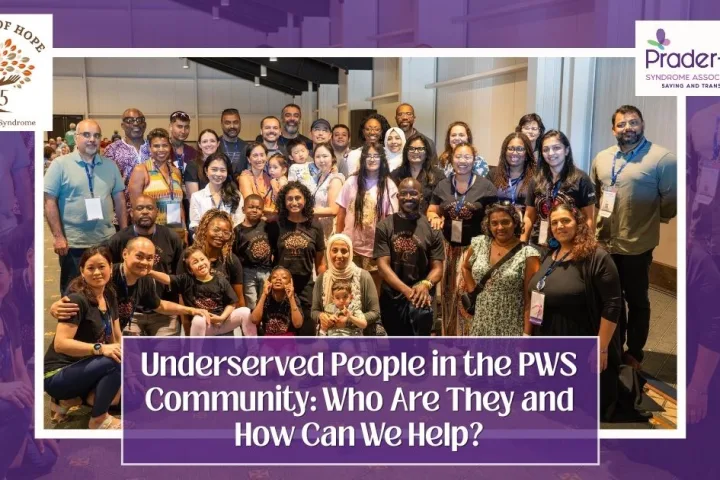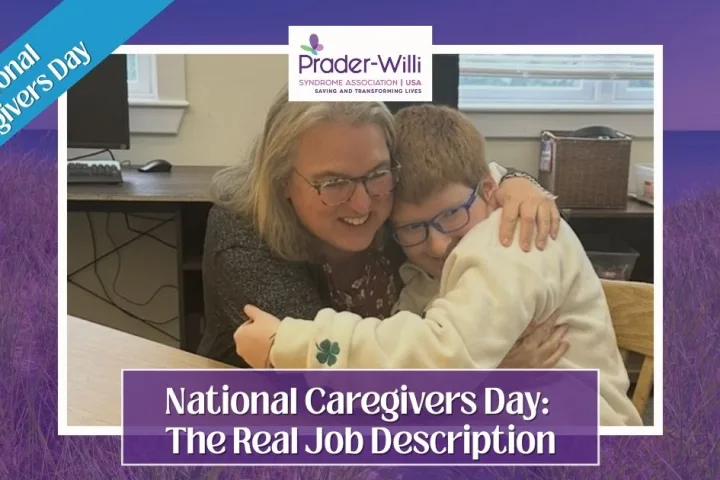By: Stacy Ward, Director of Family/Medical Support & Special Projects
Parents and families of loved ones diagnosed with Prader-Willi syndrome have an array of concerns as their children move through life. By far one of their greatest struggles and worries is adequate nutrition and healthy living. PWSA (USA)’s Family and Medical Support counselors receive hundreds of calls per year from parents, physicians, and professional providers seeking advice on this very topic.
From birth, parents are faced with learning both their child’s unique abilities and the challenges their newborn is facing. In terms of nutrition, the initial focus is often on ensuring the baby is getting adequate nutrition to grow and develop; for many this means tube feeding. After the first year of coaxing and encouraging their children to eat, parents find their need to coax and encourage waning and their child begins to enjoy eating. During the toddler years, feeding skills improve, and table foods and cups replace baby food and bottles. This is the time to establish healthy living and good nutritional habits as a family!
There is no one-size-fits-all PWS diet…All children are different and have different needs, including children with PWS! Work closely with your team of experts, endocrinologist, registered dietitian, speech and language pathologist, occupational therapist, and physical therapist to develop the most appropriate nutritional plan for your child. Toddlers may have a preoccupation with food, while food seeking behaviors become more evident in adolescence. Keep in mind that hyperphagia is a genetic drive, not a moral issue.
Below are some tips and guidelines for healthy living as a family:
- Avoid using food as a reward for good behavior.
- Create a meal and snack schedule and stick to it.
- Supervise your child when they are eating.
- Do not eat (or allow others to eat) in front of your child outside of their scheduled meal or snack time.
- Eat together at the table, not in front of the television or other electronic device.
- Create meals that include everyone’s needs and preferences. Avoid a “Your food, our food” situation.
- Keep food out of sight and out of reach.
- Reduce or eliminate the use of processed foods.
- Avoid added sugars…Read nutrition labels carefully.
- Exercise together, e.g. take family bike rides and walks, or play tag together.
- Drink more water.
These are just a few tips and guidelines to get your family started on its health journey.





 Perry A. Zirkel has written more than 1,500 publications on various aspects of school law, with an emphasis on legal issues in special education. He writes a regular column for NAESP’s Principal magazine and NASP’s Communiqué newsletter, and he did so previously for Phi Delta Kappan and Teaching Exceptional Children.
Perry A. Zirkel has written more than 1,500 publications on various aspects of school law, with an emphasis on legal issues in special education. He writes a regular column for NAESP’s Principal magazine and NASP’s Communiqué newsletter, and he did so previously for Phi Delta Kappan and Teaching Exceptional Children. Jennifer Bolander has been serving as a Special Education Specialist for PWSA (USA) since October of 2015. She is a graduate of John Carroll University and lives in Ohio with her husband Brad and daughters Kate (17), and Sophia (13) who was born with PWS.
Jennifer Bolander has been serving as a Special Education Specialist for PWSA (USA) since October of 2015. She is a graduate of John Carroll University and lives in Ohio with her husband Brad and daughters Kate (17), and Sophia (13) who was born with PWS. Dr. Amy McTighe is the PWS Program Manager and Inpatient Teacher at the Center for Prader-Willi Syndrome at the Children’s Institute of Pittsburgh. She graduated from Duquesne University receiving her Bachelor’s and Master’s degree in Education with a focus on elementary education, special education, and language arts.
Dr. Amy McTighe is the PWS Program Manager and Inpatient Teacher at the Center for Prader-Willi Syndrome at the Children’s Institute of Pittsburgh. She graduated from Duquesne University receiving her Bachelor’s and Master’s degree in Education with a focus on elementary education, special education, and language arts. Evan has worked with the Prader-Willi Syndrome Association (USA) since 2007 primarily as a Crisis Intervention and Family Support Counselor. Evans works with parents and schools to foster strong collaborative relationships and appropriate educational environments for students with PWS.
Evan has worked with the Prader-Willi Syndrome Association (USA) since 2007 primarily as a Crisis Intervention and Family Support Counselor. Evans works with parents and schools to foster strong collaborative relationships and appropriate educational environments for students with PWS. Staci Zimmerman works for Prader-Willi Syndrome Association of Colorado as an Individualized Education Program (IEP) consultant. Staci collaborates with the PWS multi-disciplinary clinic at the Children’s Hospital in Denver supporting families and school districts around the United States with their child’s Individual Educational Plan.
Staci Zimmerman works for Prader-Willi Syndrome Association of Colorado as an Individualized Education Program (IEP) consultant. Staci collaborates with the PWS multi-disciplinary clinic at the Children’s Hospital in Denver supporting families and school districts around the United States with their child’s Individual Educational Plan. Founded in 2001, SDLC is a non-profit legal services organization dedicated to protecting and advancing the legal rights of people with disabilities throughout the South. It partners with the Southern Poverty Law Center, Protection and Advocacy (P&A) programs, Legal Services Corporations (LSC) and disability organizations on major, systemic disability rights issues involving the Individuals with Disabilities Education Act (IDEA), Americans with Disabilities Act (ADA), and the federal Medicaid Act. Recently in November 2014, Jim retired.
Founded in 2001, SDLC is a non-profit legal services organization dedicated to protecting and advancing the legal rights of people with disabilities throughout the South. It partners with the Southern Poverty Law Center, Protection and Advocacy (P&A) programs, Legal Services Corporations (LSC) and disability organizations on major, systemic disability rights issues involving the Individuals with Disabilities Education Act (IDEA), Americans with Disabilities Act (ADA), and the federal Medicaid Act. Recently in November 2014, Jim retired.